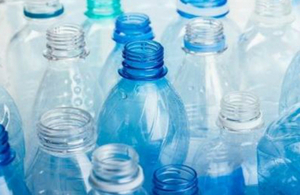Sports industry can be top of the league in reducing plastic pollution
Representatives from the sports sector will explore how the industry can tackle marine plastic pollution.

Image of plastic bottles
Environment Secretary Michael Gove will today call on sports leaders from across the Commonwealth to join the fight against plastic pollution in the world’s oceans.
As part of the Commonwealth Heads of Government Meeting taking place in London this week, the Environment Secretary will host leaders from across the sports sector on board the HMS Belfast in London to drive forward innovation and agree actions to tackle the global scourge of plastic.
With mass sporting events often generating up to 750,000 plastic bottles and seven tonnes of waste, the Environment Secretary and representatives from Premier League football, swimming and ocean sailing will look at how the sector can use its influence to tackle this blight and bring about global change.
This will build on the work already underway by industry – with this year’s Commonwealth Games banning the use of plastic balloons and rolling out water refills to reduce plastic, and Twickenham Stadium introducing a deposit return scheme for ‘fan cups’, where fans pay an extra £1 for their cup and get the money back when they return it to the bar. Tottenham Hotspur has also announced its commitment to phasing out single-use plastics across all Club operations.
Environment Secretary Michael Gove said:
Plastic pollution is one of the most pressing environmental challenges of our time and we all have a role to play to tackle the threats our oceans face.
There are few groups which have the global reach and power the sports sector does to inspire change and mobilise action. The industry is already making great strides, and I look forward to seeing how they can build on this progress to be true ambassadors for global change.
Bill Bush, Executive Director of the Premier League, will also attend the roundtable. He said:
The Premier League is well aware of the importance of taking action against plastic pollution, it affects us all and our fans expect us to do what we can to tackle this threat. We are here today to learn from others as we develop our plans to reduce plastic use throughout our operations.
We also want to use our reach to fans here and across the world to spread the word that each and every one of us can make a difference by choosing to use less plastic.
Jointly co-hosted with United Nations Environment, attendees at the roundtable will also be encouraged to join the UN’s ‘Clean Seas’ campaign – a global initiative to reduce plastic pollution in the oceans.
Endurance swimmer Lewis Pugh will attend in his role as the UN’s Patron of the Oceans. He said:
I’ve been swimming for 30 years and can be under no illusion life in our oceans is under threat like never before. Beaches across the world are littered with bags, bottles and straws, and plastic has made its way to some of the most remote corners of the ocean.
Single-use plastics have no place in the modern world and I will be urging sportsmen and women, especially those involved with ocean sports, to help us share this important message and be voices for the protection of our oceans.
This year’s World Environment Day on June 5 will focus on the issue of plastic pollution – with UN Environment working with sports organisations across the world to take action to address their plastic footprint.
The roundtable comes as just this week the Prime Minister announced the UK and Vanuatu-led Commonwealth Clean Oceans Alliance – an agreement between member states to join forces in the fight against plastic.
Britain, together with joint chair Vanuatu, will call on other countries to pledge action on plastics, be this by a ban on microbeads, a commitment to cutting down on single use plastic bags, or other steps to eliminate avoidable plastic waste. New Zealand, Sri Lanka and Ghana have already joined.
To drive this forward, the Prime Minister also announced a £61.4 million package of funding to boost global research and help countries across the Commonwealth stop plastic waste from entering the oceans in the first place.